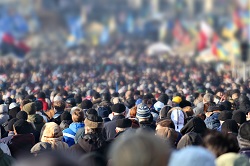Mobilising for democracy – the power of social movements and civil society
The results from the MOBILIZING4DEMOCRACY project indicate that popular social movements and civil society organisations play an important role in democratisation processes by intervening in opposition to authoritarian regimes, transition to democracy, democratic consolidation and democratic deepening. Whilst the underlying reasons behind the political, social and cultural conditions of many popular mobilisations for democratic reform are complex, they often share a single characteristic, coordinator Professor Della Porta explains – they were unexpected. Such movements also often centred around one particular public space (for example, Tahrir Square in Cairo or the Maidan Square in Ukraine) that becomes the defining symbol of citizens struggling for democratic change. ‘Intense emotions experienced during such protests (or even through a ‘virtual’ participation in them through social media) changes not only the way in which people perceive their environment, or assess their chances of success, but also, more deeply, their motivations, perceptions and interests,’ explains Prof Della Porta. ‘Those who remained at home because they feared repression, become instead outraged and feel they “must be there” – because their friends are there, but also because they start to identify with the strangers that they meet.’ By keeping the main site of protest open to all, social movements also put a special emphasis on the inclusivity of the process, aimed towards facilitating real political, economic and social change. Social movements on both left and right Social movements and civil society organisations are not just catalysts for change in newly-democratising states. Recent political events in established democracies, such as the UK’s vote for Brexit and the election of Donald Trump in the United States, have been interpreted as a lurch towards populism, led by right-wing movements and fuelled by working-class grievances over globalisation. However, data has shown that wealthy, educated people also voted substantially for Brexit and for Trump. ‘Money was injected into media campaigns that spread simple messages, and often lies, appealing to fear and focusing outrage on scapegoats,’ says Prof Della Porta. She notes that research into right-wing popular movements has long singled out a cultural demarcation, with cosmopolitanism on one side and xenophobia on the other, that separates them from the left. Prof Della Porta argues though that the research undertaken in MOBILIZING4DEMOCRACY has shown progressive social movements, even in an age seemingly dominated by populism, should not be written off just yet. She points to the fallout from the 2008-09 financial crisis in Southern Europe that saw the rise of left-wing social movements that have fundamentally challenged and altered established political systems (examples include Podemos in Spain and Syriza in Greece). ‘In recent public debate, these progressive movements on the left, however, have been temporarily outweighed by the success of right-wing parties and movements,’ she argues. ‘But they’re definitely not out of the picture for good!’ Beyond the project MOBILIZING4DEMOCRACY has been an extremely productive project, churning out 20 books and hundreds of articles and chapters. The quality of the project’s research has also been recognised as being theoretically innovative and empirically rich. Prof Della Porta is now finalising two books related to the project – one on the debate on citizenship following the Charlie Hebdo attacks in France (studied by the project as an example of democratic responses to incidents they designate as ‘critical junctures’) and one on social movements and the European refugee crisis, focusing on the ‘long summer’ of 2015. She is also beginning work on four new projects, all continuing her work on social movements and building upon MOBILIZING4DEMOCRACY’s successes. However, without a doubt, she says that one of the project’s greatest legacies is the setting-up of the Centre on Social Movement Studies (COSMOS) at the European University Institute (EUI), Italy which promises to continue studies into what has become one of the most important and intriguing features of modern democracy.
Keywords
MOBILIZING4DEMOCRACY, popular social movements, democratisation, democratic reform







